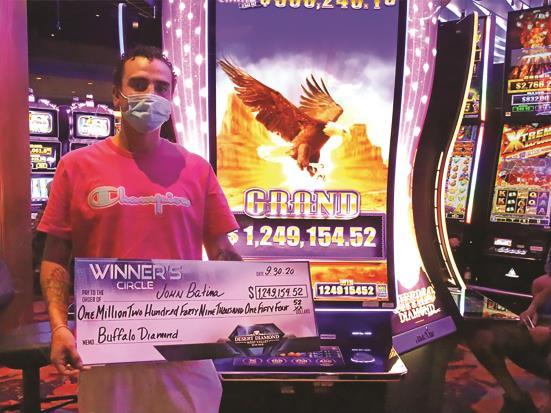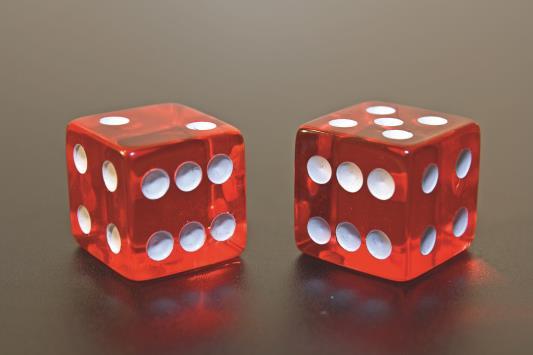PLAYERS TALK Q: Hi! I really enjoy reading the magazine each month [especially Players Talk.] Well, here are three questions that I have been thinking about each time I sit at a slot. 1. If I get four wilds for 2,000 credits but four wilds and an Ace (or five Aces) for 1,500 credits, what amount of credits do I get? The original four wilds at 2,000 credits or five Aces at 1,500 credits or both? 2. Is it true that the manufacturers of slot machines set the frequency for very large progressive payouts or does it still depend on the Random Number Generator (RNG)? 3. I read somewhere that when the slots are not being used, that the computer chip inside the slot is going through thousands of combinations per second just waiting for someone to press the play button for the RNG to begin. Is this true? Thanks for your input on everyone's questions. I can't wait for the answers! Sharon Saltzman—Arizona A: Thanks for your positive feedback Sharon! We appreciate you and your loyalty. All three of your questions are great and we’ll answer them in order. 1. This question is most easily answered by looking at a slot machine’s help screen and pay table information. Each game must provide the exact rules for Wild symbols (what they substitute for, are they part of the pay table, etc.) somewhere in the help screen to avoid misleading players. Of course, each slot has different rules regarding Wild symbols. But what is a very common game rule is the following statement “Only highest win paid” which you’ll easily find in any slot machine’s help screen using pay lines to determine winning combinations. So, based on your scenario, when you land Wild, Wild, Wild, Wild, Ace on a pay line and four Wilds pay more than five Aces, you’ll win for the four Wilds, or 2,000 credits only. But, if five Aces pays more than four Wilds according to the pay table, you’ll win only for the five Aces! In all our time in the casino business, we can’t recall an instance where a game’s rules allow for two different wins to be paid on the same pay line. That doesn't mean it’s not out there, but we don’t think so. It always pays (pun intended) to read the help screen, even if it’s just a new version of your favorite game. 2. This question is a frequent misconception among slot players. And, we totally understand why it is a misconception! How can players not feel like large jackpots are set up by someone (the
06 Arizona Gaming Guide | November 2020 | azgamingguide.com
casino or the manufacturer) when they are rarely (some people think never) awarded? So, let’s break this down. Here in Arizona, and in many other gaming jurisdictions around the country, regulations require “The highest single advertised award on each gaming device shall occur statistically, at least once in every 50,000,000 games.” That’s a direct quote from page 35, Appendix A (Technical Standards) of the Arizona Tribal-State Gaming Compact overseen by the Arizona Department of Gaming. This means, on average, over a long period of play, a very large progressive jackpot must hit at least once in every 50 million spins. Slot machine game designers, some of who are members of our staff, then choose to design games where the outcome of a very large progressive jackpot has odds of once in every 29,450,421 spins, just as an example. Those odds are less than one in 50 million, so the game will satisfy almost every gaming jurisdiction’s regulations in the world. But, the very large progressive jackpot will only be awarded if the RNG selects the winning combination associated with it. And that is purely in the hands of the RNG, not the casino, not the regulators, not the manufacturer, not even you! Can the jackpot happen on the first spin once the game is ready for play? Yes, but obviously it’s unlikely! Can the jackpot happen on the 1,234,567th spin? Yes, but it’s just as likely to happen then (or unlikely!) as on any other spin. Rest assured, as of now, the RNG, which has its own set of regulations governing its operation, statistical randomness, and basic “fairness” for the players (and the casino by extension) is in charge of determining all outcomes on a slot machine. Nothing else. We’ll let you know if anything changes. 3. We’re hoping you’re just misstating what you read, in our magazine we’re assuming, but the basic principle you mention is correct. To clarify, while a slot machine is idle or between spins, the RNG is constantly creating new random numbers, tens of thousands per second or more. Once a player hits a button initiating a wager, the slot machine’s software asks the RNG for new random numbers which are then passed from the RNG to the software program. The spin completes, any wins are awarded based on the numbers provided and the process continues. The RNG is working constantly in the background between and during spins. All the slot’s software does, at the very instant a spin is initiated, is ask the RNG for numbers it is providing at that moment. Then the RNG goes back to work. Keep the questions coming! Write us at PO BOX 20636 Mesa, AZ 85277 or email us at Editor@AZGamingGuide.com. $







